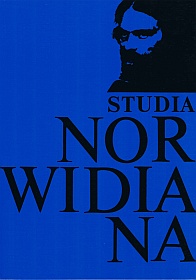Norwid and the Theological Tradition
Abstract
What is important for the “Christian tradition” is the subject-matter, value system, motif, idea and institution; what matters for the “theological tradition” is structures of thought and argument. Christian inspiration in literature need not be theological. In Norwid it is. It is useful, therefore, to study Cyprian Norwid’s attitude to the “theological” tradition. The crucial point is his attitude to Revelation.
For Vatican II, the “sacred Tradition” of the Church and the Holy Scripture form one “sacred deposit” flowing from “the same Divine source” (Dei Verbum 9-10). Over the centuries the tradition has been expressed in various forms, first in the Gospels themselves, then as a variety of theological traditions. Four such traditions have taken particularly clear shape: (1) the Lucan type (theology as a broadly taken history of salvation); (2) the Pauline type (theology as expressed in a man’s life and his moral decisions); (3) the Johannine type (with the theologically basic category of the Word of God); (4) the philosophical type (application of strict philosophy to theological reflection).
Norwid approvingly adopts and in his own way develops the first three, but fairly outspokenly dissociates himself from the fourth tradition (and current of thought) - cf. his unequivocal criticism of “scholasticism”. To explain this we need to bear in mind Norwid’s understanding of “originality” as “conscientiousness towards the sources”, which coincides with the theological understanding of tradition. The fourth current seemed the least “conscientious” to him. It also explains why Norwid took hardly any interest in contemporary theology while he was greatly interested in the Bible and Patristic writings, which were closer to the sources. The students of Norwid have known very long that the safest three ways to reconstruct the poet’s Christian outlook are by examining his concept of history, his anthropology and his concept of the word. But they did not know why. Norwid’s attitude to the theological tradition, especially its three basic currents, seems to shed much light on the problem.
Copyright (c) 1990 Studia Norwidiana

This work is licensed under a Creative Commons Attribution-NonCommercial-NoDerivatives 4.0 International License.





